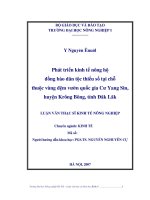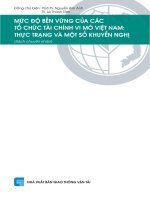Why do so many people come to believe that consuming tourist experiences will make them happier
Bạn đang xem bản rút gọn của tài liệu. Xem và tải ngay bản đầy đủ của tài liệu tại đây (57.51 KB, 3 trang )
Contemporary Issues in Tourism
Why do so many people come to believe that consuming tourist experiences will make
them happier
Nowadays, many people are faced with unbearable life problems which they want to escape
and travelling is one of the best solution. There is clear trend that an increasing number of
people choose to travel for their holidays (ITB world travel trends report December 2013).
The benefits of travelling are obvious too, as there are many physical and emotional
advantages. In general, travel is a part of life experience along with other particular aspects,
such as work, health, family, leisure and social relation.
In order to consume, the tourist must get out of familiar places and take time to acquaint with
the new environment and then, the consume has to be based on the voluntary choice to live a
certain experience. This voluntary choice may be based on the personal background, desire
for leisure or any other reasons why they want to have a holiday. As a result, the tourist
experience considered as a complex, multidimensional term and its characteristics related to
social connectedness, living quality also demonstrate the necessary of travel in personal life
experience (Sharpley & R.Stone, 2012).
According to Maslow’s Hierarchy of needs which represent for the development of an
individual need, the highest demand of human is self-actualization, refer to the desire for selffulfillment or gain satisfaction from achieving what they want (Olson, 2013). Nowadays, as
people get wealthier, their goals are bigger and their aspirations are evolving for the better.
Indeed, regarding to wealth or consumption, many people argue that happiness is when they
are appreciated with a sense of satisfaction, well-being or even other non-economic factors
(Sharpley & R.Stone, 2012).
On the other hand, there is a research that the function of consumer experience is an
increasingly important in economic and social life; otherwise tourism is one of the crucial
parts in the development of economy (Quan & Wang, 2004). However, research on income
illustrates that level of income does not have much influence on happiness. Correspondingly,
having a lot of money only benefit in increasing the quantity of experience not the quality; for
instance, the luxury trip can shows how affordable the customers are but cannot ensure about
the level of satisfaction, the memory or the enjoyment they had experienced (Hall, 2012).
To some extent, there is a new approach to the meaning of luxury, which emphasized more on
the quality of life and experiences gained rather than something that is enjoyed by upper class
1
Contemporary Issues in Tourism
people and not by others. People also focus more on enrichment experience rather than
materialistic and tourism in general is one of supporting tools for them to achieve what they
want. For example, instead of buying a modern car or wearing expensive clothes, people
today tend to spend money on going to a nice destination and enjoying good quality dishes in
a luxury restaurant (nVision, 2011).
Another concern is related to social-cultural experience, the reason why travel experience
important for personal happiness is a relation with identity, quality of life and social
connectedness. There are many advantages derived from travelling, it encourages people to
get a new perspective about their life and change the way they look the world around.
Related to the tendency of searching for authentic experiences, firstly, travelling enables a
person to gain from its profound experience and exchange of culture. Take the time to visit a
destination that is different from home environment, create the opportunity to connect with
other people and raise the knowledge by interact with several cultures that they hardly can
learn in the home country. As a result, having a chance to meet different people and
experience unpredictable situations not only raise self-confidence but also increasing social
connectivity which stimulate the level of happiness (Sharpley & R.Stone, 2012).
However, there are as many forms of tourist experiences as there are tourists, they could be
inspired by culture, adventure aspect or even just because of health improvement that travel
bring back. For more detail, travelling and explore unusual thing always attractive; it's an
open mind to new possibilities that people have and generates many life-changing ideas.
Thus, it is one of the best ways to not only leave behind the stress, but lead to the way of
happiness and fulfillment.
Overall, it is can not determine whether more or less experience, but travel as a long lasting
journey in our life, it takes people out of their comfort zones and forces them to face with
something new and challenges. In the context of consuming tourist experience, tourism
represents the consumption of positive futures, an escape to the non-ordinary and perhaps
people who spend money on experiences instead of new things are happier overall.
2
Contemporary Issues in Tourism
References
Hall, C. (2012). Consumerism, tourism and voluntary simplicity: We all have to consume, but do we
really have to travel so much to be happy? In Critical Debates in Tourism (pp. 61-68).
Clevedon: Channel View.
International, I. (2013). ITB world travel trends report December 2013. Berlin: Messe Berlin GmbH.
Retrieved from
/>2012-01.pdf
nVision. (2011). Experience Economy. UK: Future Foundation.
Olson, A. (2013, 8 13). Theory and Psychopathology: The Theory of Self-Actualization. Retrieved from
Phychology Today: />Quan, S., & Wang, N. (2004). Towards a structural model of the tourist experience: an illustration
from food experiences in tourism. Tourism Management, 25(3), 297-305.
Sharpley, R., & R.Stone, P. (2012). Introduction: Experiencing tourism, experiencing happiness. In
Contemporary Tourist Experience: Concepts and consequences (pp. 1-8). London: Routledge.
3









